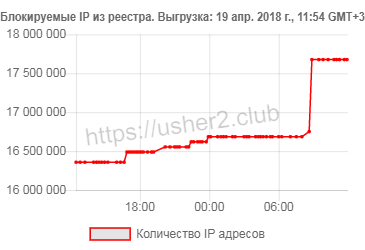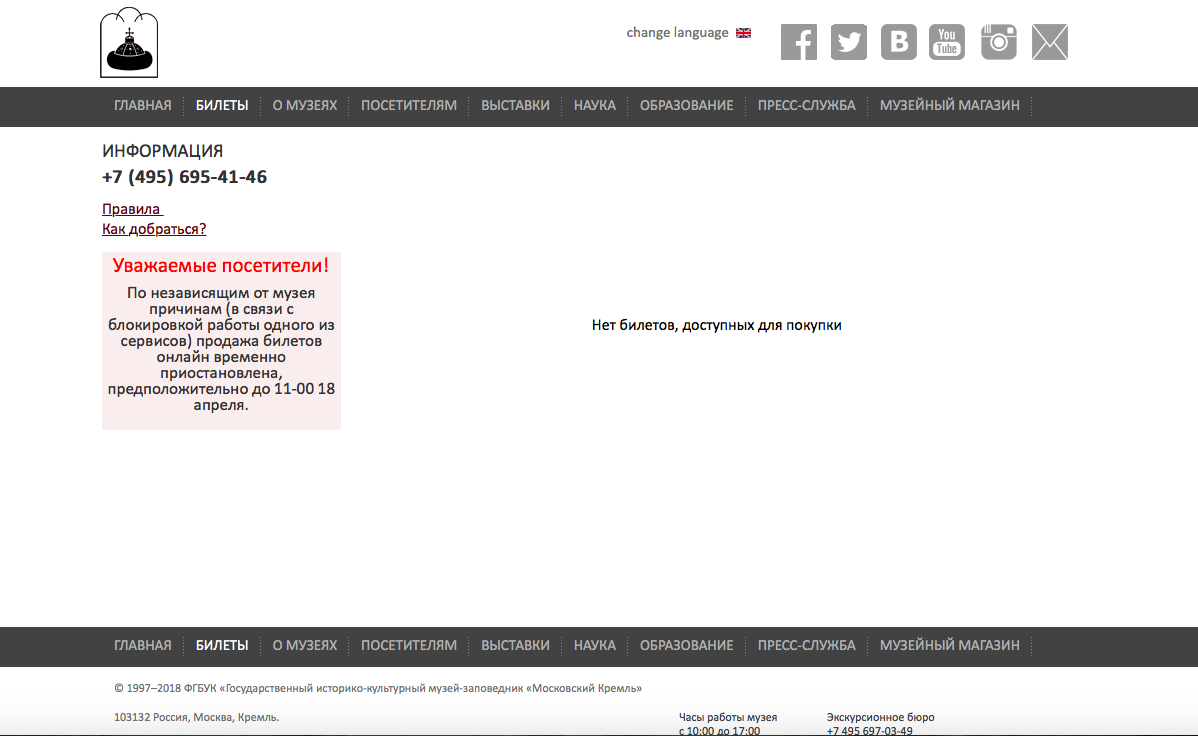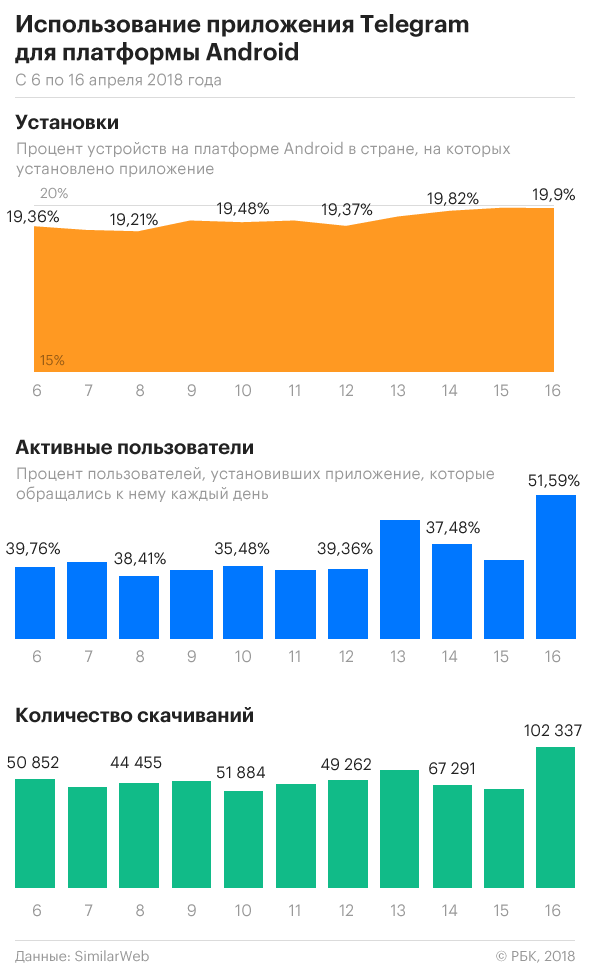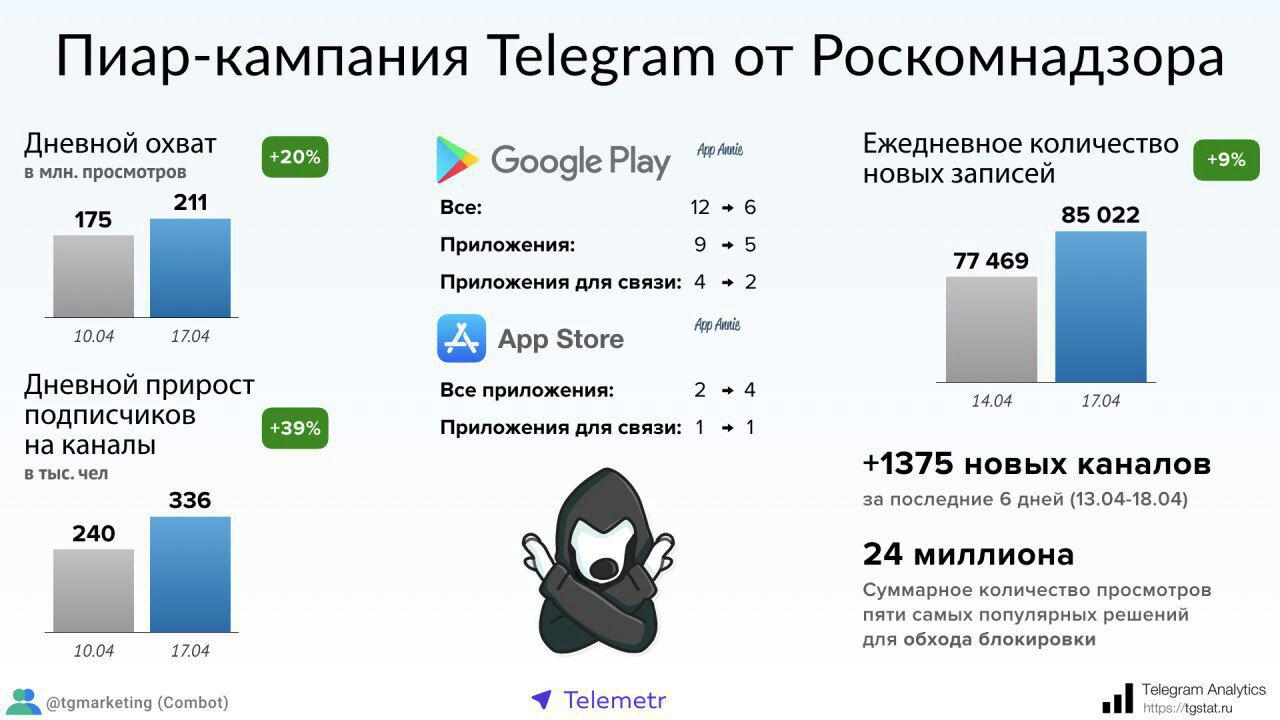The fourth day of the blockade. DigitalOcean subnets have been added to the registry. Pressure on cloud services is not working yet.
UPD. In the evening uploads , the subnet 51.136.0.0/15 (Microsoft Limited UK) appeared: these are 131 thousand Microsoft IP addresses, including Azure data centers
 April 19 went the fourth day of the blockade, which Roskomnadzor arranged for Russian users. The number of blocked IP addresses as of 11:54 reached 17,766,060 , approaching the peak values of the second day of fan locks .
April 19 went the fourth day of the blockade, which Roskomnadzor arranged for Russian users. The number of blocked IP addresses as of 11:54 reached 17,766,060 , approaching the peak values of the second day of fan locks .The main tactic of Roskomnadzor still consists in massive blocking of subnets of cloud providers in order to force them to refuse to cooperate with Telegram: “They are now deciding whether they will work in the territory of the Russian Federation or not,” said the head of Roskomnadzor, Alexander Zharov. Thousands of Russian respectable sites use the services of these providers, one after another experiencing problems accessing Russia, although Roskomnadzor is trying to deny these facts.
Two weeks ago, this scenario Roskomnadzor worked in the case of Zello, but now the tactic fails. Neither Google nor Amazon yet back down.
Elephant in a china shop
Yesterday, the subnets of the popular DigitalOcean low-cost carrier, which are used by many developers, including those for raising their own VPNs, were added to the registry upload. On the evening of April 18, Roskomnadzor instructed to close access to the 167.99.0.0/16 and 206.189.0.0/16 subnets, each of which contains 65,000 IP addresses ( copy of the upload ).
')
According to the morning unloading on April 19, the list of blocked lists 56 subnets with the dimension from / 24 to ... / 10 .
Full list
Amazon
Blackberry
Digitalocean
Google
Telegram
Other
Some of the / 22 prefixes were “collapsed” into one / 20, explains the POPSuL user , who made the list
- 13.125.0.0/16
- 13.56.0.0/14
- 18.130.0.0/16
- 18.144.0.0/16
- 18.184.0.0/15
- 18.194.0.0/15
- 18.196.0.0/15
- 18.236.0.0/15
- 34.192.0.0/10
- 35.156.0.0/14
- 35.160.0.0/13
- 35.178.0.0/15
- 35.180.0.0/16
- 52.192.0.0/11
- 52.56.0.0/16
- 52.57.0.0/16
- 52.58.0.0/15
- 52.64.0.0/12
- 54.144.0.0/12
- 54.160.0.0/12
- 54.228.0.0/15
- 54.64.0.0/13
Blackberry
- 68.171.224.0/19
- 74.82.64.0/19
- 103.246.200.0/22
- 178.239.88.0/21
Digitalocean
- 128.199.0.0/16
- 139.59.0.0/16
- 159.89.0.0/16
- 159.203.0.0/16
- 165.227.0.0/16
- 167.99.0.0/16
- 174.138.0.0/17
- 188.166.0.0/17
- 206.189.0.0/16
- 23.251.128.0/19
- 35.184.0.0/13
- 35.192.0.0/12
- 35.224.0.0/12
Telegram
- 91.108.4.0/20
- 91.108.16.0/22
- 91.108.56.0/22
- 109.239.140.0/24
- 149.154.160.0/20
Other
- 35.208.0.0/12 - Merit Network
- 159.65.0.0/16 - phscare.org
- 203.104.128.0/20 - linecorp.com
- 203.104.144.0/21 - linecorp.com
- 203.104.152.0/22 - linecorp.com
Some of the / 22 prefixes were “collapsed” into one / 20, explains the POPSuL user , who made the list
Thus, Roskomnadzor is waging war against three cloud operators. Dozens of good sites and millions of regular users suffer from this.
The actions of Roskomnadzor have already been condemned by numerous international human rights organizations. Edward Snowden supported Durov and condemned "the totalitarian attempts of the Russian government to get a backdoor to confidential correspondence of citizens."
Some experts compare the actions of Roskomnadzor with the behavior of an elephant in the room - and it is precisely the total nature of the fan block that they condemn. Earlier , the press secretary of the Ministry of Foreign Affairs of Russia condemned the actions of Roskomnadzor. Presidential Adviser German Klimenko on NTV said : “it would make sense to apologize” for “this complicated story”, and added: “I hope that Roskomnadzor will continue to act more carefully”.
Malfunctions were noted in the Kupibilet.ru air ticket search system, HyperComments commenting service. The prefix 52.192.0.0/11 from Amazon hit the block tonight - and failures were immediately noticed on various large resources, such as twitch.tv, behance.net, Adobe CC. Previously, it was reported that developer.mozila.org was partially inaccessible, Gett’s taxi service, Viber messenger, the Birdie courier service, YouTube website, Skype’s web version, Microsoft Azure website, and office web applications. Also, NuGet service, Evernote note service, Spotify music service, Slack corporate messenger, eLama contextual content automation service, numerous VPN and proxy services also suffered. The manager of the English language school, Skyeng, suggested that because of the actions of Roskomnadzor, the school would lose from 1 to 30 million rubles in one evening.
“It seems that soon, except for Telegram, nothing more will work on the Russian Internet,” jokes on Habré.
At the same time, Alexander Zharov insists that among the resources that were blocked due to the Telegram ban, there is not a single socially significant: “I must say that all the subnets, before they go to upload, are dealt with by our specialists. And we can confidently say that there are no socially significant resources on these IP addresses. ”

The sale of tickets on the Moscow Kremlin Museum site was suspended due to the blocking of one of the services.
Many officials continued to use Telegram after the start of blocking and condemned the blocking of IP addresses, but some still supported the actions of Roskomnadzor. For example, the speaker of the St. Petersburg parliament, Vyacheslav Makarov, sharply condemned the officials and deputies who continue to use the messenger: “Let them look into the eyes of the relatives and friends of the victims of the April terrorist attack last year. Let them look into their eyes and listen to what they are told, ” said Makarov and reminded that the attackers used the Telegram messenger before the attack.
As previously reported, the Kremlin supports the actions of Roskomnadzor : “The blocking will continue until the necessary conditions are met,” said Presidential Press Secretary Dmitry Peskov on April 17. He later informed the president that he was aware of the situation. Today, the press secretary made clear the prospect of further actions: “It is clear that it takes time to execute the law, it is also possible to agree and understand that this [Telegram lock] is not a matter of one day,” Peskov told reporters. “Let's just wait some more time.” Probably, the authorities are hoping that Amazon, Google or Telegram will not withstand a lengthy blockade. Indeed, for Roskomnadzor or the Russian budget, it does not cost anything financially. Cloud services incur real financial losses (due to the loss of customers) and Telegram itself.
Experts disagree on how much Telegram spends on bypassing a block. According to Alexander Lyamina from Qrator Labs, Telegram is currently losing about $ 1 million per day due to blocking. Co-founder of Zello, Alexei Gavrilov, says that most of the year less than $ 10 a day was spent on bypassing locks, but in the past few months, “due to the growing efforts of Roskomnadzor,” the amount increased to about $ 70 a day. In Telegram, the lower bar for blocking bypass costs is $ 5000 per day, but it may be ten times more, Gavrilov said.
Roskomnadzor has not yet given up formally, but is beginning to show some signs of weakness, in fact, admitting the ineffectiveness of current methods. On April 18, the ministry held a working meeting with major Internet service providers to discuss further strategy, Kommersant reports. While solutions could not be found. Probably, the meeting also discussed the problem of the hangup of the “Auditor” software and hardware complex, which is used to monitor access to prohibited sites, and the incident with the inclusion in the registry of prohibited sites of IP addresses that are needed to receive updates of the registry of prohibited sites. Roskomnadzor asked system administrators to manually remove these addresses from the registry, otherwise the system of locks will not be able to continue to work.
Legal assistance
In the first days of the Runet blockade, the human rights organization Agora received more than 120 complaints from owners of Internet sites and services affected by the actions of Roskomnadzor. Lawyers of the organization recommend the following legal response algorithm :
The general algorithm of legal response is as follows:
1) Make sure that the case is really connected with blocking, that this is not a technical problem of the server, not a ddos attack, after all.
2) Record evidence:
- check the availability of the domain name of the site and the IP address in the registry of the RKN blocklist.rkn.gov.ru . Make screenshots of this page, as well as pages of the site with the stub of the service provider;
- contact the RKN at Hotlinerkn@rkn.gov.ru with a request about the reasons for blocking;
- complain about the inaccessibility of the site to the Internet provider, record the answer (by e-mail or, in the case of a call, by recording a conversation with the support staff);
- get a certificate for a domain having a site (this can be done at the registrar), or make a printout of the whois.com page if your details are listed there.
3) To file an administrative claim for declaring actions and decisions of Roskomnadzor illegal to court (if the site is used for commercial activities, arbitration is preferable, if not, the court of general jurisdiction). In what particular court, it is better to additionally consult.
4) If the blocking is carried out on the basis of the decision of the Prosecutor General’s Office (this will be indicated in the registry or in the RKN notification, which you may have received), the Prosecutor’s Office and the RKN should be sued simultaneously.
5) If the actions of state bodies are recognized as illegal, you will have the opportunity to demand compensation for property damage. Therefore, from the very beginning, it is necessary to record evidence of costs and damage (for example, proof of payment for a change of IP address or costs associated with downtime, compensation payments to customers, expenses for a lawyer, etc.).
6) In case of refusal to satisfy the claim and after passing 4 instances, you can apply to the European Court of Human Rights. The deadline for filing a complaint is 6 months from the date of the determination of the second appeal. We have a sample complaint, here we are ready to help.
30 lawyers and attorneys from several Russian cities expressed their willingness to conduct court cases against Roskomnadzor and the Prosecutor General’s Office in the interests of the affected online services.
In early May, Agora plans to gather all the facts and draw up an appeal to the Prosecutor General’s Office to verify compliance with the lawfulness of Roskomnadzor’s actions. Then, a collective action in the European Court of Human Rights looks quite realistic, Agora believes.
In addition, Telegram lawyers appealed the court’s decision to immediately block the messenger .
The growing popularity of Telegram in Russia
According to SimilarWeb statistics, after blocking began, Telegram's daily audience in Russia grew by 27% to 1.2 million, RBC reports . The number of downloads of the Telegram application for Android has more than doubled over the week, to more than 102 thousand downloads. Now the application is installed on 19.9% of all devices running on the Android platform in Russia (a week earlier this figure was 19.5%). Of those who had the application installed, as of April 16, 51.59% used it versus 38.98% a week earlier. According to the statistics of Deloitte, a similar situation is observed on the iOS platform: over the year, the share of devices on this platform with the installed Telegram application almost doubled.

Telegram Analytics and Combot also record a significant increase in the popularity of the messenger with a mass audience. In one week, the daily coverage increased from 175 million to 211 million views, the daily increase in channel subscribers increased by 39% from 240 thousand to 336 thousand. During the week, 1375 new channels were added, and the daily number of new records grew by 9%.

The total number of views of the five most popular solutions to bypass the blocking was 24 million views. It can be assumed that the absolute majority of Telegram users have already figured out the intricacies of setting up SOCKS proxy and VPN. And if someone did not understand and the blockade from Roskomnadzor affected him, he would immediately receive information from comrades, colleagues and relatives.
Roskomnadzor explained that the blockade only applies to Telegram. The rest of the instant messengers, including WhatsApp, Viber, Facebook Messenger and Instagram, are not in the registry of information dissemination organizers (ORIs). Those who are present in the registry of the ORI, must store information about users and identify them, as well as cooperate with law enforcement agencies upon request. Including, if the service uses encryption, transfer keys to decrypt messages to special services.
Note: When commenting on this material, please follow the rules of Geektimes. Please refrain from insults and toxic behavior. Postmoderation works in the comments.
Source: https://habr.com/ru/post/358016/
All Articles